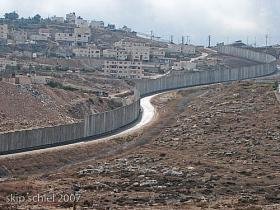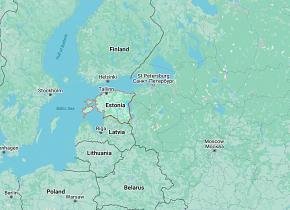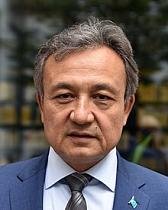Why this endless, senseless Hamas-Fatah feud?
Any struggle for freedom and sovereignty requires solid unity to face the arrogant occupation power successfully.
Unfortunately, Palestinians, fighting not just for freedom from Israel but also for internal power and money for existence, have not been able put up a united fight against the occupier-aggressor Israel. That makes the terror job of Zionism (cum Pentagon) rather easy.
Israel now under Netanyahu keeps drawing Palestinian blood.
The course of tensed Hamas-Fatah relations inside Palestine is the result of vacuum in their minds and hearts and sheer madness to behave without logic but that reality in fact reveals the real state of affairs of Islamic community globally particularly Muslim nations in West Asia where Israel, the arch foe of Islam, calls all the shots. Their mindless infighting even as they are being fatally crushed by USA-Israel terror twins in fact repulses and sickens the mankind.
So, Fatah and Hamas factions, rather meaningless opposite political outfits in an occupied nation, treat each other as their main enemy to be wiped out of Palestine territories, leaving behind in tact the Israel and criminalized Jewish leaders. That is exactly what Israel and its allies like USA expect from the perpetual feud inside the tiny Palestine territories. .
This fatal approach of killing each other by themselves in order to strengthen the factions existing in a territory without sovereignty and under permanent duress and terror attacks by Israel is obviously seen by USA as their “historic†victory.
By strenuous efforts, Israel has literally created a two nations’ territory in Palestine. While the so-called Islamist Hamas rules the tiny Gaza Strip, pro-west Fatah controls the other tiny stretch West Bank.
The great divide between the two took place in 2007 when Hamas won the general poll but Israel, USA and Fatah not only jointly rejected the results but also ignited troubles in Palestine, leading eventually to a civil war that killed many Palestinians, thereby making USA, Israel happy.
Fatah, which now controls the Palestinian Authority (PA) in the West Bank, and the Islamist group Hamas, which wrested control of the Gaza Strip in a civil war in 2007 after the poll, have waged a low-intensity conflict for over a decade. Between flare-ups, the two have often responded to the will of their people by announcing various unity agreements. None of these agreements have led to actual national harmony, and Sunday’s surprise announcement that Hamas had dissolved its administrative committee in Gaza and agreed to reconciliation is unlikely to defy the precedent.
Nearly a decade of infighting and efforts for recompilation went on as Israel strengthened its position in Palestine, Palestinians without anything to live on lost hopes of the goodness coming from the government. Israel began targeting women, old people and children as collective punishment for seeking sovereignty.
Just keep talking for unity
The last Palestinian legislative election was held in 2006, when Hamas won a surprise victory that laid the ground for a political rupture. The group fought a short civil war with the Palestinian president Mahmoud Abbas’s Fatah movement in the Gaza Strip in 2007, and since then Hamas has governed the territory.
Numerous attempts since 2011 to reconcile the two movements and form a power-sharing unity government in Gaza and the West Bank have failed. They agreed to form a national reconciliation government in 2014, but Hamas’s shadow government has continued to rule Gaza.
In recent times, both Fatah and Hamas began talking for a unity government but nothing came out as Hamas is not really winning for compromises. People continue to suffer while employees do not receive their salaries as Israel collects the taxes form Palestine and keeps them to use as a powerful bully to silence the Palestinians, being besieged by Israel and Egypt through terror blockades.
Palestinians both Fatah and Hamas live like Israeli prisoners as Isreali military-police establishments target them, while the UNSC, mandated to protect entire world, looks the other way as it is also eager to kill the Palestinian race. . .
Very recently, the factions met to sort out their differences and come together to face the reality together. Of the demands Palestinians often make of their leaders, reconciliation between their two largest political factions perennially tops the list.
Economic strains
Israel, backed by USA and NATO allies, control Palestine and decides all policies for them, collects taxes and keep them with it, making the Palestinians go angry and angry. Many poor Palestinian workers are being hired for cheap labor by Israel to construct illegal settlements inside Palestine territories. Besides, the PLO and Fatah stop paying the money to Gaza Strip pay the salary, among other charges.
Egypt has been brokering talks with Fatah to implement a deal signed in Cairo with Hamas in 2013 to end the dispute and form an interim government before elections. In July this year it emerged Hamas was seeking a rapprochement with the Palestinian leader once regarded as its greatest enemy, as the Islamist group faces unprecedented challenges from all sides.
Hamas’s leadership held talks with Mohammed Dahlan – the exiled former Fatah leader in Gaza whose supporters Hamas defeated in the 2007 civil war – in the hope he could persuade Egypt to come to the aid of Gazans struggling under Israel’s decade-long economic blockade.
Hamas’s position has been weakened by developments in the region, including Saudi-led moves against Qatar, once a major financial contributor to Gaza. The group is also under further pressure from an aggressive policy implemented by Abbas, who governs in the West Bank. In June he asked Israel to significantly cut its electricity supply to Gaza’s 2 million residents.
The electricity crisis comes on top of Gaza’s many other woes. Abbas has also cut the salaries of thousands of former Palestinian Authority employees, many his supporters, who he had instructed not to work for the Hamas government.
Meanwhile, like a wild beast without rules, Israel’s increasing restrictions on exit permits for Gaza residents, an escalating sewage crisis that is contaminating the strip’s beaches and high levels of unemployment are all contributing to a mounting sense of exhaustion.
Some polls show that if parliamentary elections were held now, Hamas would win them in both Gaza and the Israeli-occupied West Bank, the seat of Abbas’s Palestinian Authority.
Mahmoud Abbas, the leader of Fatah and the president of the PA, responded with an unprecedented show of force. He cut off payments for electricity to the Gaza Strip, effectively plunging the impoverished coastal enclave into darkness.
Hamas refuses to interact with Israel, so the PA has subsidized parts of Gaza’s electricity input since 2007. Abbas also slashed the salaries of his out-of-work PA employees in Gaza, cut payments for Hamas prisoners in Israeli jails, reduced medical-supply shipments, and announced that over 6,000 PA workers would be forced into early retirement. These wide-ranging sanctions were the toughest Abbas had ever levied against Hamas, let alone his own people.
USA and Israel arm twists PLO leaders Abbas to terrorize the Palestians in Gaza Strip and from the start, Abbas made his demands of Hamas clear: dismantle the administrative committee, bring Gaza back under the PA’s control, and prepare for national elections. Hamas countered by insisting it wouldn’t budge until he rescinded his crippling sanctions. For months, the two appeared to be stuck at a familiar impasse until Sunday’s announcement in Cairo, where Hamas seemingly buckled to all of Abbas’s demands.
Publicity stunt?
Maybe for publicity stunt, Hamas says it is willing to dissolve its Gaza administration, 10 years after it fought a bloody war with Fatah. Hamas has agreed to hold talks with the rival Fatah movement, dissolve the Gaza administrative committee and hold general elections, in a deal to end their long-running feud in the Palestinian territories, the group has said in a statement.
A senior Fatah leader, Mahmoud Aloul, welcomed the Hamas pledge but told Voice of Palestine radio: “We want to see that happening on the ground before we move to the next step.†Hamas said in its statement that it agreed to dissolve the administration running Gaza, allow the reconciliation government to carry out its duties in the territory, to hold elections and enter into talks with Fatah.
The likeliest explanation for Hamas’s sudden shift is the change in its leadership. Earlier this year, the results of the group’s secret internal elections were announced as Ismail Haniyeh, a former prime minister in the unity government of 2007, and Yahya Sinwar, a hardline leader of Hamas’s military wing, became the number one and number two leaders of the faction. Both represent a shift in Hamas’s center of gravity from the exiled political class abroad back to the Gaza-based military leadership. Initially, their rise left many concerned that another war with Israel was inevitable. Sinwar, in particular, was a wild card: he arose within Hamas’s military wing by weeding out—and personally executing—collaborators, and played a prominent role as a military leader in the 2014 war.
Due to the Zionist target, Gazans live in abject poverty, endure substandard water and health conditions, and face astronomic unemployment rates. In the past, they’ve rallied behind their Hamas leaders in times of crisis, but those days seem far away.
Israel inspired Fatah’s bloody campaign against Hamas in the 1990s and 2000s, demonstrates the severity of Hamas’s plight.
In January, over 10,000 took to the streets outside of one of Hamas’s electricity offices to protest the Hamas group’s policies.
Public discontent with both Hamas and the PA is now more common, and Hamas’s new leaders have felt the pressure. Sinwar, whose duties within the Hamas organization involve administrating Gaza Strip, has turned pragmatic in his time in office.
Sinwar, especially, has reached out to anyone and everyone for help. This includes Mohammad Dahlan, the former Fatah security chief in Gaza, who negotiated a deal with the Egyptians and Emiratis to get fuel and money into the Strip. That Sinwar would seemingly reconcile with Dahlan, the architect of
Viewed in this light, it seemed only a matter of time until Hamas either acquiesced or sparked another war with Israel. In the past, financial pressure has caused Hamas to lash out violently.
Weeks before the Zionist terror 2014 war, Hamas members raided and closed local banks in Gaza. Yet for now, the group’s new leadership has surprisingly opted for the former, though not without attempting to stick it to their Fatah rivals.
Announcing their openness to reconciliation just days before Abbas is expected to meet with President Donald Trump at the UN General Assembly will put the PA leader in a bind. A similar reconciliation agreement in 2014 all but ended the John Kerry-led dramatic peace process;
Abbas, 82, is backed by the west and now 12 years into what was to be a four-year term. He is an unpopular leader according to opinion polls. He has no clear successor and there are no steps being taken toward organizing a presidential election.
Abbas cannot expect the United States to agree to his negotiating terms if he’s just inked another agreement with Hamas- an Israeli designated terror group.
Hamas appears to be attempting to corner Abbas. With his demands ostensibly met, Hamas will turn up the public pressure on him to ease his campaign against Gaza. This puts Abu Mazen Abbas and Fatah to the real test. The longer his sanctions remain in place, the more everyday Palestinians will begin to wonder why he hasn’t lifted the pressure against his own people in West Bank. Abbas is likely to slow-roll his response in order to buy himself time with Trump before likely countering by insisting his demands weren’t actually met, issuing further demands he knows Hamas can’t meet, or committing to a new round of negotiations.
In March, Hamas announced the formation of the administrative committee, a quasi-governmental body that would ostensibly assume more functions of a state. Fatah leaders reacted with outrage, accusing Hamas of forming a shadow government that would “perpetuate the division instead of promoting reconciliation.â€
Observation
Neither side will be able to bridge the ideological divide or forget their blood-soaked history anytime soon. If actual unity was possible, the two Palestinian factions would have likely found the formula in their previous agreements: Mecca in 2007, Sana’a in 2008, Cairo in 2011, Doha in 2012, Cairo again in 2012, and the Shati refugee camp in 2014.
The reality looks bleak as Hamas is unlikely to ever truly give up its military control over Gaza. The faction wants Abbas to pay for the costs of governing. Abbas wants total acquiescence and disarmament. Ultimately, there’s no middle ground here. Sunday’s announcement is just another move in a decade-long game of chess where everyday Palestinians continue to pay the price.
For one, all unity talks are less about unity and more about finances. Genuine desire for freedom and sovereignty is missing in both West Bank and Gaza. This emboldens the Zionist military forces to keep terror attack the besieged Palestinians, killing even children. The firing of the toy missiles into empty lands of Israel only harmed Palestine cause further.
Only third rate fools repeat the nonsensical mistakes.
Comments
There are 0 comments on this post














